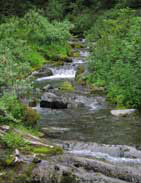
 The Whitewater Creek Conservation Association (WCCA) is committed to:
The Whitewater Creek Conservation Association (WCCA) is committed to:
- Protect and preserve the site of the Annual Meeting of the WCCA on the northern shore of Whitewater Creek (Oregon).
- Restore the populations of native fishes to their pre-dam levels.
- Utilize Whitewater Creek and its environs as a natural laboratory for educating youth and adults about the health of riparian ecosystems.
During our annual meeting in 2004, we will have the opportunity to demonstrate
our commitment to our mission statement. Under the supervision of Wayne Somes
(Fishery Biologist, Willamette National Forest) and Dave Klug (Hydrology Technologist,
Willamette National Forest); volunteers will spend up to 3 days emplacing large
woody debris in Whitewater Creek. In essence we will be placing large logs across
the creek in an attempt to create the plunge pools that are needed to provide
increased habitat for the native fish that inhabit our little stream. Rather than
the raceway that currently typifies Whitewater Creek, we hope to help Ma Nature
recruit large logs to slow the flow and create new salmonids habitat. I'm hoping
that we can begin with the large logs that currently reside on the trail into
the campground.
Currently we anticipate that we will need 4-5 adults per day over
a 3-day period. The composition of the work crew can change each day, and no one
needs to fear that they will be giving up 3-days of their vacation time for volunteer
service. Conversely, this should provide everyone with the opportunity to observe
and understand a vital riparian restoration effort as it happens. In essence,
this is a great opportunity to increase habitat for our native fish, and a wonderful
laboratory for education all members of the Association on the process. If we
can use some of the logs that currently block access to our site, so much the
better.
While this variety of work requires that we comply with NEPA (National
Environmental Protection Act), Wayne has assured me that the paperwork can be
done prior to our arrival. So, I look forward to your assistance at our annual
meeting in 2004. - Fish

 The Whitewater Creek Conservation Association (WCCA) is committed to:
The Whitewater Creek Conservation Association (WCCA) is committed to: